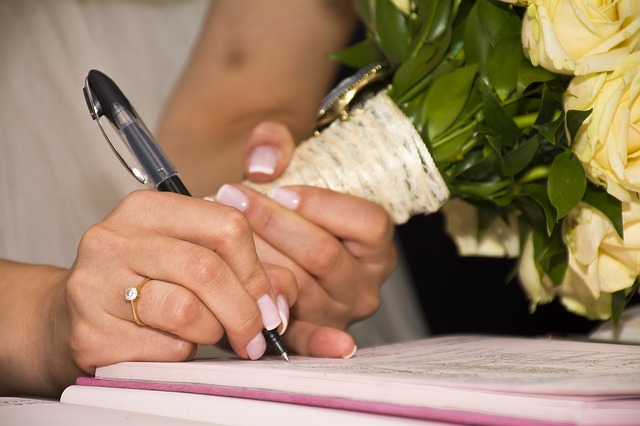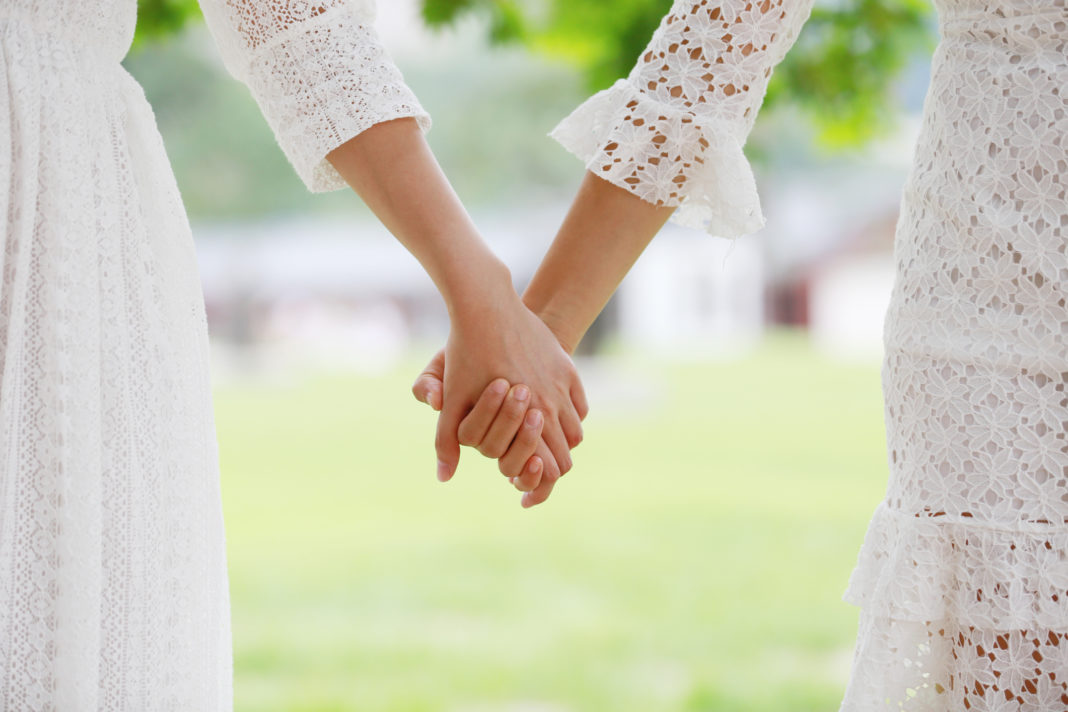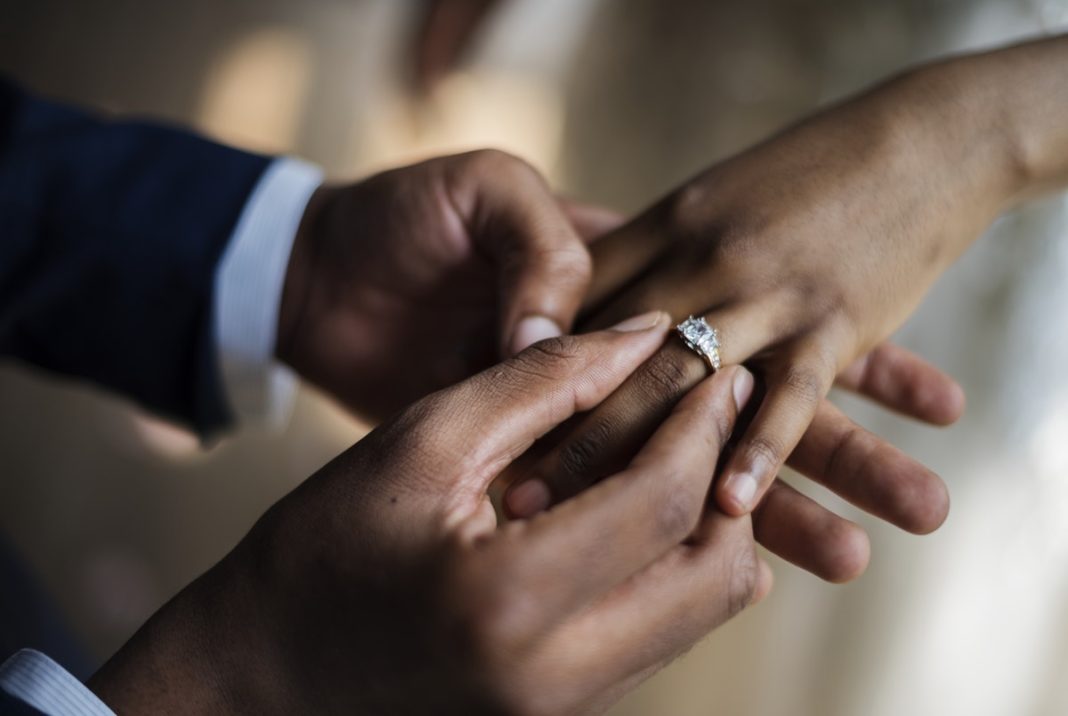
With civil partnerships becoming legal for opposite-sex couples across the UK, a lot of couples have been wondering on social media ‘Can I make it a humanist ceremony?’
In the UK and crown dependencies, there are different laws governing civil partnerships in different countries. There are also different laws covering the legality of humanist ceremonies.
The short answer is this: if you want to have a humanist ceremony to recognise your partnership, you absolutely can! But how you go about that will vary depending on where you live in the UK.
You can have a humanist ceremony alongside your civil partnership in any part of the UK or crown dependencies, but only in Scotland can you have a legally recognised civil partnership conducted by a humanist celebrant. That’s because only the government can conduct civil partnerships in England, Wales, or Northern Ireland. Couples living in those places will need to be legally registered as a civil partnership through a registrar.
We’ve put together a handy guide to help you understand the different laws affecting civil partnerships (and how they relate to same-sex marriages) in the UK and crown dependencies.
What is a civil partnership?
A civil partnership is a type of union which gives couples the same legal rights and benefits as couples who have entered into a marriage – rights such as pension benefits, life insurance recognition, next of kin rights, property rights, tenancy rights, social security benefits, and so forth.
A civil partnership is legally recognised after the couple each signs their partnership document before a registrar and two witnesses, or in Scotland, before someone authorised to perform religious or humanist marriages.
Originally, civil partnerships were only for same-sex couples, but since 2019 in England and Wales and 2020 in Northern Ireland they have also been available to opposite-sex couples. The same change is also in the pipeline in Scotland.

Can you change your name following a civil partnership?
Absolutely! A couple may choose one surname or they may combine their surnames to form a double-barrelled name.
Following the name change, when applying for a passport or a driving licence, you can use your certificate of civil partnership as evidence of a change of name.
Civil partnerships in England and Wales
In England and Wales, you must be at least 18 years of age to enter into a civil partnership. If you are aged between 16 and 18, you will usually need parental consent prior to the ceremony.
Before registering the partnership, you have to give notice to the appropriate local authority’s Register Office and you must have lived in England/Wales for at least seven days before the ‘giving of notice’ of the partnership. A waiting period of fifteen days is standard between giving notice and the ceremony.
In England and Wales only registrars are allowed to conduct legally binding civil partnerships. Same-sex civil partnerships have been legal since 2005 and opposite-sex civil partnerships have been recognised since December 2019.
For couples wishing to have a humanist ceremony, our celebrants are happy to conduct these in the same way they do for couples having a civil marriage – before or after the legal act. Each ceremony is unique and personally tailored to the couple, including personalised vows or promises, readings, poetry, music and symbolic acts such as lighting a unity candle.
In Wales, Welsh speakers may request the formal partnership ceremony to be conducted in Welsh, and all partnership documents issued in Wales feature both English and Welsh. Humanist CeremoniesTM also offers humanist celebrants who can perform your ceremony in Welsh.
In March 2014, the Marriage (Same Sex Couples) Act 2013 legalised same-sex marriage in England and Wales and granted those in a civil partnership the ability to convert their partnership into a marriage.
Civil partnerships continue to be available to same-sex couples in England and Wales as an alternative to weddings – they fulfil the same function as a civil marriage.
Civil partnerships in Jersey
In Jersey, civil partnerships for opposite-sex and same-sex couples are conducted by the States of Jersey Superintendent Registrar and conducted in a location approved for civil partnerships between 8am and 7pm.
You must be at least 18 years of age to enter into a civil partnership. If you are aged between 16 and 18, you will usually need parental consent prior to the ceremony.
Between two weeks and three months’ notice in needed before your ceremony.
If you’ve had a civil partnership, you can apply to convert it into a marriage. (Your civil partnership will cease to exist, but you will be recognised as married from the date of your civil partnership.)
For couples wishing to have a humanist ceremony, our celebrants are happy to conduct these in the same way they do for couples having a civil marriage – before or after the legal act. Each ceremony is unique and personally tailored to the couple, including personalised vows or promises, readings, poetry, music and symbolic acts such as lighting a unity candle.
Civil partnerships in Northern Ireland
In Northern Ireland, you must be at least 18 years of age to enter into a civil partnership. If you are aged between 16 and 18, you will usually need parental consent prior to the ceremony.
Unlike the residency rules in England and Wales, you don’t need to have lived in Northern Ireland for any period of time prior to your civil partnership ceremony – but there is a minimum notice period of 28 days between contacting the Registrar and holding the ceremony.
Only registrars and deputy registrars can perform civil partnerships in Northern Ireland, but your ceremony can take place either in the Registrar’s office or at a licensed venue such as a hotel or castle.
Since 13 January 2020, opposite-sex couples have been enter into civil partnerships in Northern Ireland – and same-sex couples can register to marry. But, for couples already in a civil partnership, they are not able to convert it into a legally recognised marriage. (The Northern Ireland Office aims to consult on this in 2020.)
In Northern Ireland, humanist celebrants who are part of the Humanist Ceremonies network are able to conduct legally recognised marriages for both opposite-sex and same-sex couples. They may not perform legally recognised civil partnership ceremonies, but they can provide non-legal ceremonies which are personally tailored to each couple, including personalised vows or promises, readings, poetry, music, and symbolic acts such a handfasting.
Civil partnerships in Scotland
You must be at least 16 years of age to enter into a civil partnership in Scotland.
In Scotland, both legally recognised humanist marriages and legally recognised civil partnerships are delivered by Humanist Society Scotland. Like Humanist Ceremonies, they’re a registered charity whose celebrants you can trust to deliver your perfect ceremony.
Same-sex marriage has been legally recognised in Scotland since 2014. The Marriage and Civil Partnership (Scotland) Act 2014 does not allow couples to convert their civil partnership into a marriage, however they can marry one another without the need to dissolve their existing civil partnership.
Opposite-sex couples and civil partnerships in the UK

In June 2018, the Supreme Court ruled that allowing same-sex couples but not opposite-sex couples to enter a civil partnership is incompatible with the European Convention on Human Rights. As a result, legislation in England and Wales was changed in March 2019, and from 2 December 2019, opposite-sex couples can now enter into civil partnerships in thise two countries.
From 13 January 2020, opposite-sex couples can enter into civil partnerships in Northern Ireland.
In the Scottish Parliament, legislation allowing opposite-sex couples to have civil partnerships is pending.
Humanist celebrants in the UK and crown dependencies
In our celebrant network, we have over 475 celebrants trained and accredited by Humanists UK, the charity which pioneered humanist ceremonies over 120 years ago. To find a humanist celebrant near you, check out our map.
For inspiration for your humanist ceremony, follow us on Twitter, Facebook, Instagram, and Pinterest.





